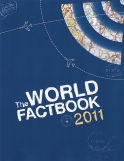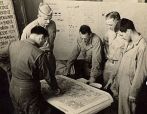 A great publication not only provides timely and valuable information, but it also allows us a glimpse into the times and events that necessitated its production.
A great publication not only provides timely and valuable information, but it also allows us a glimpse into the times and events that necessitated its production.
Such is the case with the CIA’s World Factbook—which marks its 50th anniversary in 2012 for the classified version and over 40 years for the public version described here— and shows us a glimpse into how Pearl Harbor and the Cold War changed the way America began to gather information about all corners of the globe.
The Factbook has its origins in the aftermath of the Japanese attack on Pearl Harbor, and the realization by Congress and the White House that lack of coordinated intelligence across all Governmental departments had left the United States woefully unprepared for the attack, and determined to correct this as a national security necessity and priority. According to the CIA historians:
During World War II, intelligence consumers realized that the production of basic intelligence by different components of the US Government resulted in a great duplication of effort and conflicting information.
Detailed and coordinated information was needed not only on such major powers as Germany and Japan, but also on places of little previous interest. In the Pacific Theater, for example, the Navy and Marines had to launch amphibious operations against many islands about which information was unconfirmed or nonexistent.
Image above: During WWII, OSS intelligence reviewed existing maps with the military. Source: Top Secret Writers
JANIS Drops In
To correct this deficiency, in 1943, General George B. Strong (G-2), Admiral H. C. Train (Office of Naval Intelligence – known as ONI), and General William J. Donovan (Director of the Office of Strategic Services – known as OSS, the precursor of the CIA) oversaw the formation of a Joint Intelligence Study Publishing Board to assemble, edit, coordinate, and publish the Joint Army Navy Intelligence Studies (JANIS).
JANIS was the first cross-departmental basic intelligence program to fulfill the needs of the US Government for an authoritative and coordinated appraisal of strategic basic intelligence.
All groups involved in the war agreed that finished basic intelligence was required that covered territories around the world where the war was being fought. They needed detailed, up-to-date maps and geography; basic understanding of the cultural, economical, political and historical issues of the people and the region.
Compiling and publishing this information for the Allied intelligence needs, JANIS became an indispensable reference for war planning and execution.
The Cold War Gives Birth to the CIA… and the National Intelligence Survey
But the Cold War that immediately followed World War II showed that there was just as much need for continued intelligence gathering as ever. In the 1946 publication “The Future of American Secret Intelligence,” national security author George S. Petee wrote: “The conduct of peace involves all countries, all human activities – not just the enemy and his war production.”
In acknowledgement of this, the Congress established the Central Intelligence Agency in 1947 which immediately took over responsibility for JANIS. The next year, the National Security Council authorized the National Intelligence Survey program as a peacetime replacement for the wartime JANIS program. By 1955, the Hoover Commission evaluating the CIA advised Congress that: “The National Intelligence Survey [NIS] is an invaluable publication which provides the essential elements of basic intelligence on all areas of the world. There will always be a continuing requirement for keeping the Survey up-to-date.”
The Sum of All Facts: The World Factbook
Subsequently, the World Factbook was created as an “annual summary and update to the encyclopedic NIS studies.”
Originally published only as a classified publication starting a half century ago in August 1962 (just prior to the Cuban Missile Crisis of October 1962), the World Factbook was first published in its declassified version for public consumption in June 1971, 40 years ago.
 Image: CIA map produced for President Kennedy’s team estimating the range of Soviet missiles being set up in Cuba during the Cuban Missile Crisis in October 1962. Source: Canadian History Portal
Image: CIA map produced for President Kennedy’s team estimating the range of Soviet missiles being set up in Cuba during the Cuban Missile Crisis in October 1962. Source: Canadian History Portal
Today’s World Factbook is the declassified version of the finished basic intelligence compiled by the U.S. Central Intelligence Agency (CIA) and coordinated across all the U.S. intelligence community. It uses only recognized, authoritative sources, not only CIA-gathered intelligence, but also a wide variety of U.S. Government agencies from the National Security Agency, Department of Defense, Department of State, Department of Agriculture, Defense Intelligence Agency, and hundreds of other published sources around the world.
Printed Version Provides an Annual Snapshot
Once a year, the Government Printing Office takes a snapshot of this information from the CIA as of January 1 and produces a printed version of the World Factbook. It provides unparalleled and succinct information about hundreds of countries in a format that provides an easy-to-use comparison.The Factbook has been available from GPO since 1975.
The 2011 version just published provides a two- to three-page summary of the history, people, government, economy, geography, communications, transportation, military, and transnational issues for 267 world entities, including U.S.-recognized countries, dependencies, and other areas in the world.
Each country has its own basic map and shows its flag, but of particular interest are the maps of the major world regions, as well three pull-out maps included in the publication: Physical Map of the World, Political Map of the World, and Standard Time Zones of the World Map, all of which can be used as wall maps.
Who Can Benefit from the World Factbook?
A perennial best seller in the GPO bookstore, The World Factbook is used by not only US Government officials, but is a must-have reference for researchers, news organizations, businesses, geographers, international travelers, teachers, professors, librarians, and students.
In short, after 40 years, the World Factbook is still the best source of up-to-date, summarized intelligence about the world for any “thinker, traveler, soldier, or spy” of any age!
 Image: Pupils at Crosby’s Valewood Primary School near Liverpool, England, dress up as ‘Spies’ as part of a creative project. Photographer: Andrew Teebay. Source: Liverpool Echo
Image: Pupils at Crosby’s Valewood Primary School near Liverpool, England, dress up as ‘Spies’ as part of a creative project. Photographer: Andrew Teebay. Source: Liverpool Echo
To gather your own up-to-date intelligence about the world we live in, you can obtain the World Factbook 2011 at one of these locations:
How can you get this publication?
- Buy the current version of the World Factbook and selected previous editions online 24/7 at GPO’s Online Bookstore.
- Buy it at GPO’s retail bookstore at 710 North Capitol Street NW, Washington, DC 20401, open Monday-Friday, 9am to 4pm, except Federal holidays, (202) 512-0132.
- Find it in a library.
Some Interesting “DID YOU KNOW?” Facts related to the CIA’s World Factbook:
- Question: What separates “intelligence” from “information”?
- Answer: According to the CIA: The Intelligence Cycle is the process by which information is acquired, converted into intelligence, and made available to policymakers. Information is raw data from any source, data that may be fragmentary, contradictory, unreliable, ambiguous, deceptive, or wrong. Intelligence is information that has been collected, integrated, evaluated, analyzed, and interpreted. Finished intelligence is the final product of the Intelligence Cycle ready to be delivered to the policymaker.
The three types of finished intelligence are: basic, current, and estimative. Basic intelligence provides the fundamental and factual reference material on a country or issue.
- Question: “Why is the British Labour Party misspelled?”
- Answer: When American and British spellings of common English words differ, The World Factbook always uses the American spelling, even when these common words form part of a proper name in British English.
- Question: “What is a ‘doubly landlocked’ country and which are the only two in the world?”
- Answer: A doubly landlocked country is one that is separated from an ocean or an ocean-accessible sea by two intervening countries. Uzbekistan and Liechtenstein are the only countries that fit this definition.
- Question: “Why does the Factbook use metric units, even though Americans still use traditional units of measure like feet, pounds, and Fahrenheit?”
- Answer: US Federal agencies are required by the Metric Conversion Act of 1975 (Public Law 94-168) and by Executive Order 12770 of July 1991 to use the International System of Units, commonly referred to as the metric system or SI. In addition, the metric system is used by over 95 percent of the world’s population.
- Question: “Why is the European Union listed at the end of the Factbook entries? It’s not a country!”
- Answer: The European Union (EU) is not a country, but it has taken on many nation-like attributes and these may be expanded in the future. A more complete explanation on the inclusion of the EU into the Factbook can be found in the Preliminary statement.
About the Author: Michele Bartram is Promotions Manager for GPO’s Publication and Information Sales Division and is responsible for online and offline marketing of the US Government Online Bookstore (Bookstore.gpo.gov) and promoting Federal government content to the public. She’s a big fan of the National Spy Museum and of spy movies, which she is going to enjoy for her birthday tomorrow.


[…] CIA’s 50th anniversary edition of The World Factbook 2012-13 (Read our post “CIA’s World Factbook: Global intelligence for every thinker, traveler, soldier, spy” for information about this annual […]
LikeLike
You made blogging look easy. The overall look of your
site is fantastic, as well as the content!
Reply
LikeLike
That is a really good tip particularly to those fresh to the blogosphere.
Simple but very precise info… Thank you for sharing
this one. A must read article!
LikeLike
Hello, its good to be here. Really love to write on economic topics and I am controller in Beauly.
I personally love reading blogs similar to this
seeing that there are common interests. Will likely be back
again soon.
LikeLike
This site certainly has all of the info I wanted about this subject and didn’t know who to ask.
LikeLike
Wow, incredible blog layout! How long have you been blogging for?
you made blogging look easy. The overall look of your
site is fantastic, as well as the content!
LikeLike
Great post however , I was wanting to know if you could write a litte
more on this subject? I’d be very thankful if you could elaborate a little bit further. Kudos!
LikeLike
Alissa- Thanks! There are plenty more book reviews coming up about the CIA.
LikeLike
Well written post. People should read this.
LikeLike
creative writing…
[…]CIA’s World Factbook: Global intelligence for every thinker, traveler, soldier, spy « Government Book Talk[…]…
LikeLike
What is the JANIS Korea book in the photo? Are these documents available to the public? My grandfather served in Korea, I spent some time there as well, and would love to have a look at something like this.
LikeLike
I found a reference to the JANIS book on http://www.OldBookBank.com. This must have been a copy that surfaced over there, but I don’t know if they are declassified and available to the public. You might want to contact the State Department’s Office of the Historian to see if they can provide you with some direction:
Historian web site http://history.state.gov/about/contact-info
The Office of the Historian can be reached via email at history@state.gov, by phone at 202-663-1123, or by fax at 202-663-1289.
LikeLike
bookmarks online…
[…]CIA’s World Factbook: Global intelligence for every thinker, traveler, soldier, spy « Government Book Talk[…]…
LikeLike
I totally heart this!!!!!!!!!!!!
LikeLike
Excellent blog!
Im very interested in II world war history, but to be honest, there are not many sources where you can read about CIA in those times. There are many sources where you can find stories about russian agents which were very active at that time, but not CIA. Can i buy this book via Amazon?
Cheers!
P.S. i hope you don`t mind if i`ll share this blog to my friends? 😉
LikeLike
Thanks for the compliment and the question. This book is normally available at Amazon (search for ISBN 9780160893650), but after checking their site just now, it seems to be out of stock on their site. However, it is in stock on our U.S. Government Bookstore at the same price, except our price includes Free Standard Shipping worldwide. You can find the The World Factbook 2011 here.
Another book that has information on spies and terrorism is The FBI Story.
We also have a Journal on intelligence you may be interested in: Studies in Intelligence: Journal of the American Intelligence Professional, V. 53, No. 4 (December 2009)
If you are interested in the Cold War and Soviet-American relations, you might want to check these books:
1) Watching the Bear: Essays on CIA’s Analysis of the Soviet Union
2) Soviet-American Relations: The Detente Years, 1969-1972
3) Foreign Relations of the United States, 1961-1963, V. 5, Soviet Union
4) Foreign Relations of the United States, 1969-1976, V. 14: Soviet Union, October 1971-May 1972
Hope this helps!
Oh, and feel free to share this blog with anyone…
– GPO
LikeLike
Very interesting points here and I am really glad you shared this with us.
LikeLike
wonderful post and blog as well
i’m very happy to write this comment to you
i like you blog and i share it
thank you
LikeLike
Another great blog and thanks for sharing great information, would be especially useful if one was traveling out of the country, get more reliable information than by the news media.. and a belated Happy Birthday to YOU.. and may all your presents be filled with happiness!
LikeLike
Thanks so much, Larry!
LikeLike
Thanks …
LikeLike
I’ve always been interested in World History with thoughts of becoming an interpreter someday. Thank you for thinking of me!
LikeLike
This is a great resource for learning some key facts about every country. I did translation when I was in Spain, both for high-end retailers and movie studios. It was a lot harder than I would have thought, but I found that specialized vocabulary knowledge (medical, legal, technology, business) was much more in demand. Today, there are online sites for freelancers to take translation jobs as well. I wish you great luck in your future!
LikeLike
I really enjoyed this posting and would love to see more like it regarding the history of individual government publications.
LikeLike
Thank you, we have more on the way!
LikeLike
Michele, you need to go on a Librarian speaking tour. Your headings will get you noticed anywhere, and reading your posts will seal the deal.
Another excellent post.
Jeff
LikeLike
Thanks for the kudos, Jeff. All the practice having pun battles with my family as a kid come in handy, eh? I’ll get some more practice tomorrow at my birthday festivities with my family and friends. I’m sure I will be “pun-tificating” with more blog posts after getting together with them… 😉 Cheers!
LikeLike